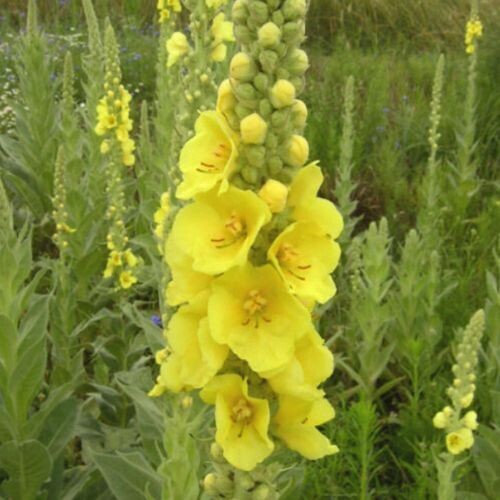MULLEIN (Verbascum thapsus) *Organic herb for horses - lung-supporting, cough-soothing, airway-clearing
Benefits of Mullein for Horses
Mullein is probably the lungs' best friend - renowned for soothing coughs, easing inflammation, and keeping the respiratory system strong.
Its velvety leaves and fabulous flowers are renowned for their expectorant constituents to keep the respiratory system comfortably balanced. A timeless botanical for horses facing dust, pollen, or seasonal challenges, for every breath, naturally.
Please note this is a nutritional, functional horse food supplement and not veterinary medicine. See Dr Kellon's Horse Sense - 'Nutrition is not 'Alternative' Therapy.
💧Tincture
Our human-grade tinctures give you a ready-to-absorb potent source of phytonutrients at the highest-strength available, for immediate absorption straight into the bloodstream and to the body’s cells.
- Verbascum thapsus
- Leaf
- Infused 1:3 35%
- Wild Harvested
Feed Guide
- 6ml/100kg bodyweight, daily in feed.
- Always shake the bottle to disperse any sediment.
- 3-year shelf-life.
- Our tinctures come in a heat-sealed, twin-neck, child-resistant HDPE plastic dosing bottle, complete with dosing chamber. *HDPE (High-Density Polyethylene) plastic is 100% recyclable, and energy-efficient to produce. Safe for food/water storage, it reduces waste and emissions while resisting wear. A top sustainable choice to match the EquiNatural ethos.
🌿Dried Herb
- Verbascum thapsus (Mullein)
- Leaf
- Wild Harvested
- Origin Albania
Feed Guide
- 5g/100kg bodyweight per day, i.e.25g/day for a 500kg horse.
- 1-year shelf-life.
- Want a scoop? You can add a scoop to your basket during checkout.
- Supplied in a resealable, food-grade foil pouch for freshness.
Functional Nutritional Value
Constituents: Flavonoids, mucilage, triterpenoid saponins, tannins, volatile oil, glycosides, carbohydrates, proteins, fats and fixed oils, iridoid compounds, vitamins and minerals.
- Our range of botanicals are all grown, harvested and dried without the use of agri-chemicals, non-irradiated and GMO free - see our Quality page for Quality Management & Certification Documents.
- Laboratory tested for identification and compliance to the British and European Pharmacopoeia standards.
- Human grade.
- Please be aware that if you're purchasing our dried botanicals for human use, our dried range is cut to appropriate sizes for feeding to horses.
Clinical Considerations
Advisories
- Mullein is widely regarded as a gentle and well-tolerated herb for equine use, particularly for supporting the respiratory system.
- If your horse is receiving bronchodilators or corticosteroids, veterinary guidance is recommended before concurrent use.
Contraindications
- Due to lack of equine-specific safety data always check with your vet before feeding mullein to the pregnant or nursing mare.
Mullein in History & Tradition
Mullein is a plant of beautiful contradictions - soft yet strong, weedy yet elegant. Its tall spire of sunny yellow blooms can often be spotted along roadsides or peeking out from the most unexpected places. (In my own town of Wells, Somerset, there’s a solitary mullein growing against a medieval cottage wall on the lane to the Cathedral - perfectly in keeping with its ancient heritage.)
Its downy leaves have earned it nicknames like blanket herb , velvet herb , and fluffweed. Like marshmallow, they’re thick, soft, and full of soothing mucilage - but don’t be fooled: the fine hairs can also irritate skin and even cause dermatitis. As one herbalist once said, mullein “ embraces contradictions. ”
A long, respected history
Used since ancient times, mullein was praised in the Middle Ages by Culpeper for ailments ranging from cramps and coughs to warts and gout. By the 19th century, mullein blossom oil was recommended for everything from earache to urinary tract inflammation, bronchitis, rheumatism, and even orchitis (testicular inflammation - ouch!). It was also a popular Native American traditions to smoke mullein leaves for asthma and bronchitis.
The respiratory specialist
Today, mullein is best known as a soothing, tonifying herb for the respiratory system.
- Expectorant – helps clear mucus and congestion from the lungs
- Anti-inflammatory & antispasmodic – calms inflamed airways and eases spasms
- Moistening – ideal for dry, unproductive coughs
Today? Modern research supports its anti-inflammatory (Speranza et al., 2009) and anti-influenza (Rajbhandari et al., 2009) properties, with herbalists using it for coughs, asthma, colds, bronchitis, and wheezing. Its expectorant action helps make coughing more effective, easing congestion without irritation.
Beyond the lungs
Mullein’s lubricating quality is also valued for joint hydration and synovial fluid production - making it a quiet ally for musculoskeletal comfort. Some even believe it can help in the healing of tricky-to-set fractures.
Whether growing wild in a field or standing tall beside a country lane, mullein is a herb that soothes, softens, and strengthens - inside and out. Personally I get very excited when I see mullein's tall velvety stem shoot up unexpectedly, followed by its beautiful yellow flowers!
You probably won’t be surprised to see that mullein is a major player in all our Respiratory blends.
Safety
- More good news; mullein is considered very safe with no known side effects. If you are going to do some mullein DIY though, remember to strain any leaf infusion through a cloth strainer to remove those irritating hairs.
© EquiNatural 2026. All content is original work protected under copyright, and may not be re-published, duplicated, or rewritten for commercial use without permission.


